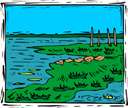wet·land
(wĕt′lănd′)n.
A lowland area, such as a marsh or swamp, that is saturated with moisture: a program to preserve our state's wetlands.
American Heritage® Dictionary of the English Language, Fifth Edition. Copyright © 2016 by Houghton Mifflin Harcourt Publishing Company. Published by Houghton Mifflin Harcourt Publishing Company. All rights reserved.
wetland
(ˈwɛtlənd)n
(Biology) (sometimes plural)
a. an area of swampy or marshy land, esp considered as part of an ecological system
b. (as modifier): wetland species.
Collins English Dictionary – Complete and Unabridged, 12th Edition 2014 © HarperCollins Publishers 1991, 1994, 1998, 2000, 2003, 2006, 2007, 2009, 2011, 2014
wet•land
(ˈwɛtˌlænd)n.
Often, wetlands. land that has a wet and spongy soil, as a marsh, swamp, or bog.
[1770–80]
Random House Kernerman Webster's College Dictionary, © 2010 K Dictionaries Ltd. Copyright 2005, 1997, 1991 by Random House, Inc. All rights reserved.
wet·land
(wĕt′lănd′) A low-lying area of land that is saturated with moisture, especially when regarded as the natural habitat of wildlife. Marshes, swamps, and bogs are examples of wetlands.
Did You Know? The idea of a wetland may strike you as strange, because we usually think of the world as either wet (rivers, lakes, oceans) or dry (mountains, plains, coasts). But wetlands are both. They're soggy enough that you wouldn't want to go camping in them, but there's enough soil for plants like reeds, bushes, and even trees to take root and grow. In the past, many wetlands were filled in to make farmland or to develop the area for housing—more than half of the original wetlands in the continental United States are gone. Today, however, scientists have discovered that wetlands can act like huge filters, removing pollutants from the waters of an area before those substances can do harm. They can serve as reservoirs, and they may help in flood control by absorbing excess water. Wetlands are also home to many different plant and animal species that have evolved to live in the wetland's unique conditions.
The American Heritage® Student Science Dictionary, Second Edition. Copyright © 2014 by Houghton Mifflin Harcourt Publishing Company. Published by Houghton Mifflin Harcourt Publishing Company. All rights reserved.
ThesaurusAntonymsRelated WordsSynonymsLegend:
| Noun | 1. |  wetland - a low area where the land is saturated with water wetland - a low area where the land is saturated with waterbog, peat bog - wet spongy ground of decomposing vegetation; has poorer drainage than a swamp; soil is unfit for cultivation but can be cut and dried and used for fuel land, soil, ground - material in the top layer of the surface of the earth in which plants can grow (especially with reference to its quality or use); "the land had never been plowed"; "good agricultural soil" |
Based on WordNet 3.0, Farlex clipart collection. © 2003-2012 Princeton University, Farlex Inc.
wetland
noun marsh, moss (Scot. & Northern English dialect), swamp, bog, slough, fen, quagmire, morass wetlands rich in plants, insects and birds
Collins Thesaurus of the English Language – Complete and Unabridged 2nd Edition. 2002 © HarperCollins Publishers 1995, 2002
wetland
nounThe American Heritage® Roget's Thesaurus. Copyright © 2013, 2014 by Houghton Mifflin Harcourt Publishing Company. Published by Houghton Mifflin Harcourt Publishing Company. All rights reserved.
Translations
mokřad
kosteikko
wetland
[ˈwetlənd] N → pantano m, zona f húmeda or acuosawetlands → pantanos mpl, tierras fpl pantanosas
Collins Spanish Dictionary - Complete and Unabridged 8th Edition 2005 © William Collins Sons & Co. Ltd. 1971, 1988 © HarperCollins Publishers 1992, 1993, 1996, 1997, 2000, 2003, 2005
Collins English/French Electronic Resource. © HarperCollins Publishers 2005